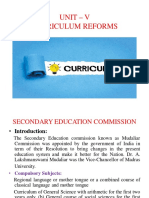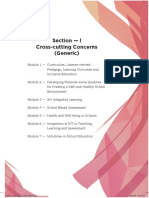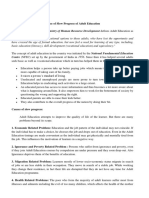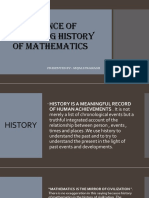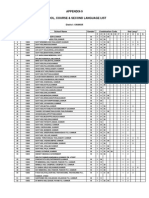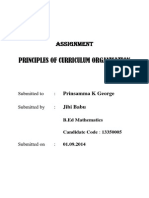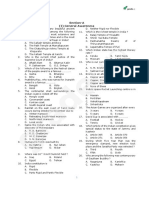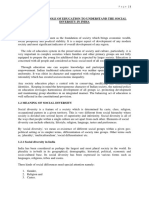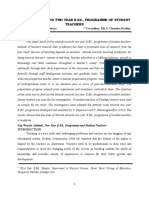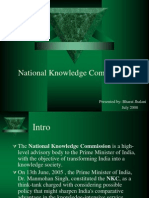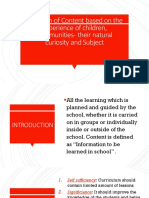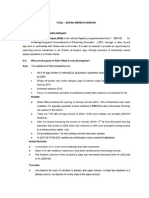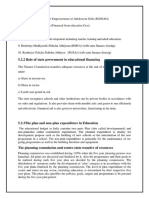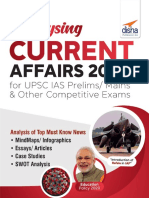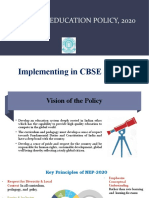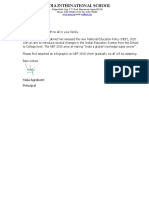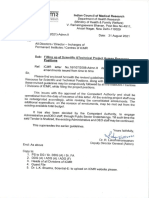0 ratings0% found this document useful (0 votes)
445 views11 pagesNep 2020
Uploaded by
rks_rmrctCopyright
© © All Rights Reserved
We take content rights seriously. If you suspect this is your content, claim it here.
Available Formats
Download as PDF or read online on Scribd
0 ratings0% found this document useful (0 votes)
445 views11 pagesNep 2020
Uploaded by
rks_rmrctCopyright
© © All Rights Reserved
We take content rights seriously. If you suspect this is your content, claim it here.
Available Formats
Download as PDF or read online on Scribd
You are on page 1/ 11
ES.
1, NEW PEDAGOGICAL AND CURRICULAR STRUCTURE
‘The extant 1042 structure in school education will be modified with a new pedagogical and.
‘curricular restructuring of 5+3+344 covering ages 3-18.
Currently, children in the age group of 3-6 are not covered in the 10+2 structure as Class 1
begins at age 6, In the new 5+3+3+4 structure, a strong base of Early Childhood Care and
Education (ECCE) from age 3 is also included.
Universal provisioning of quality early childhood development, care, and education must thus
be achieved as soon as possible, and no later than 2030, to ensure that all students entering
Grade | are schoo! ready, (Para 1.1)
‘The overarching goal will be to ensure universal access to high-quality ECCE seross the
na phased manner. (Parn 1.4)
A concerted national effort will be made to ensure universal access andl afford opportunity to
all children of the country to obtain quality holistic education-including vocational education
= from pre-school (o Grade 12. (para 3.2),
‘The standard-settingregulatory framework and the facilitating systems for school regulation,
accreditation, and governance shall be reviewed to enable improvements. on the basis of the
leamings and experiences gained in the last decade. This review will aim to ensure that all
students, particularly students feom underprivileged and disadvantaged sections, shall have
universal free and compulsory aecess to high-quality and equitable schooling from early
childhood care and education (age 3 onwards) through higher secondary education (i.¢., until
Graide 12), (para 8.8)
2. EARLY CHILDHOOD CARE AND EDUCATION: THE FOUNDATION OF LEARNING
Universal provisioning of quality early chitdhood development, care, and education must be
achieved as soon as possible, and no later than 2030,
‘The overall aim of ECCE will be to atin optimal outcomes in the domains of: physical and
motor development, cognitive development, sacia-etnotional-ethical development,
culturaVantistic development, and the development of communication and early language,
literacy. and numeracy.
A National Curricular and Pedagogical Framework for Barly Childhood Care and Education
(NCPFECCE) for children up to the age of 8 will be developed by NCERT
‘The numerous rich local traditions of India developed over millennia in
stories, poetry. games, songs, and more, will also be suitably incorporated.
ECCE shall be delivered through a significantly expanded and strengthened system of early-
childhood education institutions consisting of the following:
© stand-alone Anganwadis,
* Anganwaudlis co-located with primary schools;
* pre-primary schoots/sections covering a least age 5 10 6 years co:
located with existing primary schools; and
All languages will be taught in an enjoyable and interactive style
‘States may enter into bilateral agreements to hire teachers from each other
‘The three-languiige learned by children will be the choices of States, regions, and of the
students, so long as at least two of the three languages are native to India
Efforts to prepare high-quality bilingual textbooks and teaching-learning materials for science
and mathematics, so that students are enabled to think and speak about the two subjects both
in their home language/mother tongue and in English,
Indian Sign Language (ISL) will be standardized across the eo
curriculum materials developed, far use by students with hearin,
try, and National and State
CURRICULAR INTEGRATION OF ESSENTIAL SUBJECTS, SKILLS, AND
CAPACITIES
12.Ni
13.)
Certain subjects, skills, and eapacities will be emphasized in school: such as, scientific temper
and evidence-based thinking: creativity and innovativeness; sense of aesthetics and art: oral
and written communication; health and nuitition; physical education, fitness, wellness, and
sports; collaboration and teamwork; problem solving and logical reasoning; vocational
exposure and skills; digital literacy, coding, and computational thinking; ethical and moral
reasoning; etc.
Introduction of contemporary subjects such as Artificial Intelligence, Design Thinking,
Holistic Health, Organic Living, Environmental Education, Global Citizenship Education
(GCED), ete. at relevant stages
Mathematics and computational thinking to be given increased emphasis throughout school
years, Activities involving coding to be introduced in Midalle Stage
Bayless days will be encouraged throughout the year for various types of enrichment activities
involving ans, quizzes, sports, and vocational crafts.
(TIONAL CURRICULUM FRAMEWORK FOR SCHOOL EDUCATION (NCFSE)
‘The formulation of a new and comprehensive National Curricular Framework for School
Education, NCPSE 2020-21, will be undertaken by the NCERT
‘The NCFSE document shall henceforth be revisited and updated once every 5-10 years, taking.
imo account frontline curriculum.
\ATIONAL TEXTBOOKS WITH LOCAL CONTENT AND FLAVOUR
All textbooks shall aim to contain the essential core material on a national level, but at the
same time contain any desired nuuinees and supplementary material as per loeal contexts ard
needs.
States will prepare their own curricula which may’ be based on the NCFSE prepared by NCERT
to the extemt possible and! prepare textbooks (which may be based on the NCERT textbook
aterials to the extent possible), incorporating State flavour and material us needed,
Concerted efforts, through suitable changes in curriculum and pedagogy, will be made to
significantly reduce the weight of school bags and textbooks.
14, KNOWLEDGE OF INDIA
© The Regulatory System shall be empowered (o take stringent action against substandard and
dysfunctional teacher education institutions (THEIs) that do nox meet basic educational criteria,
after giving one year for remedy of the breaches.
‘© By 2030, only educationally sound, multidisciplinary, and integrated teacher education
programmes shall be in forve.
© All multidisciplinary universities and colleges - will aim to establish, education departments
will also run B.Ed. programmes, in collaboration with other departments such as psychology,
philosophy, sociology, neuroscience, Indian languages, arts, music, history, literature, physical
education, science and mathematics,
+ Allstand-alone TEts will be required to convert to multidiseiptinary institutions by 203
they will have to offer the 4-year integrated teacher preparation programme,
ince
+ The adiission to pre-service teacher preparation projraiinies shall be throuigh suitable subject
and aptitucl tests conducted by the National Testing Agency.
* Allfresh Ph.D. entrants, irespective af discipline, will be required to take eredit-hased courses
‘eaching/edueation pedagogy. writing celated to their chosen Ph.D subject and will also have
a mninimum number of hours of actual teaching experience,
©The use of technology platforms such as SWAYAM/DIKSHA for online training of teachers
will be encouraged.
* A National Mission for Mentoring shall be established, with a large pool of outstanding
scniorteticed faculty who would be willing to provide short and long-term
memtoring/professional support to university/college teachers,
23. EQUITABLE AND INCLUSIVE EDUCATION: LEARNING FOR ALL,
‘+ Focus on Socio- Economically Disadvantaged Groups (SEDGs)
-DGs can be broadly categorized based on:
© Gender idemtities (particularly female snd transgender individuals),
© Socic-cultural identities (such as Scheduled Castes, Scheduled Tribes, OBCs, and
minorities),
© Geographical identities (such as students from Villages, Small towns, and aspirational
districts},
© Disabilities (including learning disabilities), and
© Socio-economic conditions (stich as migrant communities, tow income households,
children in vulnerable situations, victims of or children of victims of trafficking,
‘orphans including child beggars in urban areas, and the urban poor).
= Separate strategies will be formulated for focused attention for reducing each of the category-
wise gaps in school education,
+ Within SEDGs, and with respect to all the above policy points, special attention will be given
ta reduce the disparities in the educational development of Scheduled Castes and Scheduled
‘Tribes. As a part of the efforts to enhance participation in school education, special hostels in
‘migrant labourers, and other children who are dropping out of schowl due to various
circumstances are brought back into mainstream edication.
© achieve universal participation in school by carefully tracking students, as well as their
Jeaming levels
+ Counsellors ar well-trained social workers connected 0 schools/school camplexes,
‘+ Scope of school education will be broadened to facilitate multiple pathways to learning
involving both formal and non-formal education modes.
+ NIOS and Stale Open Schools will also offer A. B and C levels that are equivatent io Grades
3. 5, andl 8 of the formal school system; secondary education presgrams that are equivalent to
Grades 10 and 12; vocational eduestion courses/programs: and sdult litersey and life-
enrichment programs,
* States encouraged to develop these in regional languages by establishing new/strengthening
existing State Institutes of Open Schooling (S1OS),
© The focus will be to have less emphasis on input and greater emphasis on output potential
conceming desired learning outcomes.
* Efforts to involve community: Databases of literate volunteers, retined
scientists/government’semi government employees, alumni, and educators will be created for
this purpose,
5. RESTRUCTURING SCHOOL CURRICULUM AND PEDAGOGY IN A NEW 5434344
DESIGN
‘+ The curricular and pedagogical structure of school education: guided by a 5+3+3+4 design
corresponding to the age ranges of 3-8, 8-11, 11-14, and 14-18 years, respectively.
‘+ No parallel changes to physical infrastructure will be required.
© will eo
of
© Foundational Stage (in two parts, that is, 3 years of Anganwadlifpre-school +2 years
in primary school in Grades. 1-2; both together covering ages 3-8): with flexible,
multitevel, play/sctivity-hased leaming and the curriculum and pedsgoy of ECE,
© Preparatory Stage (Grides 3-5, covering ages 8-11): with the introduction
Experiential leaming across the sciences. mathematics, arts, social sciences. and
‘humanities.
© Middle Stage (Grades 6-8, covering ages 11-14): with a subject-ariented pedagogical
anal curricular style,
© Secondary Stage (Grades 9-12 in two phases, i.c., 9 and 10 in the first and 1 and 12
in the second, covering ages 14-18) : with greater depth, greater eritical thinking,
‘gremer attention to life aspirations, and greater flexibility and student ct
subjects, and option to exit at grade 10 and re-enter ata Jater stage in grade 11.
6, HOLISTIC DEVELOPMENT OF LEARNERS.
+ Overall thrust of curriculum and pedagogy reform to move towards real understanding and
learning how to learn ~ and away from the culture of rte learning
‘© stand-alone pre-schools
Allof above would have workersteachers specially trained in the curriculum and pedagogy of
ECCE.
For universal access to ECCE, Anganwadi Centres will be strengthened.
Prior (o the age of 5 every child will move to a “Preparatory Class” or “Balavatikca” (that is,
before Class 1), which has an ECCE-qualified teacher,
‘Training of current Anganwadi workervteachers: those with qualifications of 10+2 and above
shall be given a 6-month certificate programme in ECCE:
qualifications shall be given a one-year diploma programme
‘These programmes may be run through digital/distance mode allowing teachers to acquire
ECCE qualifications with minimal disruption to their current work,
ECCE curriculum: The plaming and implementation of early childhood care and education
curriculum will be carried out jointly by the Ministries of HRD, Women and Child
Development (WCD), Health and Family Welfare (HFW), and Tribal Affairs.
3. FOUNDATIONAL LITERACY AND NUMERACY: AN URGENT & NECESSARY
PREREQUISITE TO LEARNING
‘A. National Mission on Foundational Literacy and Numeracy will be set up by the Ministry of
Human Resource Development (MHRD) on priority.
All State/UT govemments will prepare an implementation plan for attaining. universal
foundational tieracy and numeracy in all primary schools for all learners by grade 3 to be
achieved by 2025.
‘Teachers will be trained fo impart foundational literacy ancl numeracy.
‘To ensure that all students are school ready, an interim 3-month play-based “school preparation
module” for all Grade 1 studonts will be developed by NCERT and SCERTs.
‘A national repository of high-quality resourses on foundational literacy and umeracy will be
made available on the Digital Infrastructure for Knowledge Sharing (DIKSHA),
States to consider establishing innovative models to foster peer-tutoring and. volunteer
activities, ete. for promoting foundational literacy and numeracy.
Public and school libraries will be significantly expanded, and digital libraries will also be
established.
A National Book Promotion Policy will be formulated.
‘The nutrition and health (including mental health) of children will be addressed, through
healthy meals and regular health eheck-ups, and health cards will be issued to monitor the
sane
4. CURTAILING DROPOUT RATES AND ENSURING UNIVERSAL ACCESS TO
EDUCATION AT ALL LEVELS
‘Two initiatives for above:
© no: school remains deficient on infrastructure support from pre-primary school to
Grade 12 and altemative and innovative education centres to ensure that children of
+ Alternative forms of schools, will be encouraged to preserve their traditions or altemative
peilagogical styles. At the same time, they will be supported to integrate the subject and
learning areas prescribed by the NCFSE into their curricula in order to reduce and eventually
¢liminate the underrepresentation of children from these schools in higher education,
+ All participants in the sshool education system, including teachers, principals, administrators,
counsellors, and students, will be sensitizes to the requirements ofall students, the notions of
Jusion and equity, and the respect, dignity, and privacy of all persons. (para 6.19)
© The school curriculum will include, early on, material on human values such as respect fer all
Petsons, empathy, tolerance, human rights, gender equality. non-violence, global citizenship,
inclusion, ancl equity. [1 would also include more detailed knowledge of various cultures,
religions, languages, gender identities, etc. to sensitize and develop respect for diversity. (para
6.20)
24, EFFICIENT RESOURCING AND EFFECTIVE GOVERNANCE THROUGH
SCHOOL COMPLEXES/CLUSTERS
‘+ The challenges of optimal utilization and sharing of resources will, by 2025, be addressed by
State/UT governments by aclopting innovative mechanisms to group or rationalize schools,
such as, schoo! complexes,
© Benefits of school complex include - improved support for children with disabilities, more
topic-centred clubs and academic/sports/arts/crafts events across school complexes, sharing of
teachers including use of ICT tools to conduct viral classes, hetter student support,
enrolment, attendance, and performance through the sharing of counsellors
+ To funher enhance cooperation and positive synergy aniong schools, ineluding between public
and private schools, the twinning/pairing of one public school with one private school will be
adopted across the country.
25. STANDARD-SETTING AND ACCREDITATION FOR SCHOOL EDUCATION
+ Independent responsibilities within the State school education system and the approach to
regulation are as follows:
© The Department of Schoot Education will be responsible for overall monitoring and
policymaking for continual improvement.
©The educational operations and service provision for the public schooling system of
the whole State will be handled by the Directorate of School Elucation
© Aneffective quality self-regulation or accreditation system will be instituted for all
ges of education including pre-school edueation - private, public, and philanthropic
= to ensure compliance with essential quality standards, States/UTs will set up an
independent, State-wide, body called the State School Standards Authority (SSSA)
which will establish a minimal set of standards. This information shall be self-
disclosed and will be made available on a public website maintained by the SSSA.
© Academic matters, including academic standards and curricula in the State will be led
by the SCERT (with close consultation and collaboration with the NCERT),
© The SCERT will develop a School Quality Assessment and Accreditation Framework
(SQAAF) through wide consultations with all stakeholders,
* Public and private schools (except the schools that are managed/aidew/controlled by the Central
government) will be assessed and accredited on the same criteria, benchmarks, and. processes,
26, REIMAGINING VOCATIONAL EDUCATION:
© By 2025, at least 50% of leamers through the schoo! and higher education system shall have
exposure to vocational education
© Beginning with vocational exposure at early ages in middle and secondary school, quality
vocational education will be integrated smoothly into higher education.
© Every chile to fearn at least one vocation and exposed to several more.
+ Sampling of important vocational crafts, such a8 carpentry, electric work, metal work,
gardening, pottery making, etc. as decided by States and local communities during Grades 6-
8.
* A 104ay bagless period sometime during Grades 6-8 to inter with local vocational experts
such as carpenters, gardeners, potters, artists, ete
lar internship opportuni
ncluding holiday periods,
to leam vocational subjects to students throughout Grades 6-
© Vocational courses through online mode will also be made available.
* Vocational education will be integrated in the educational offerings of all secondary schools
ina phased manner over the next devade, Towards this, secondary schools will also collaborate
with ITIs, polytechni¢s, loval industry, ete, Skill labs will also be set up
27. ADULT EDUCATION AND LIFELONG LEARNING
© Amadutt education curriculum framework will be developed by a new constient body of the
NCERT that is dedicated to adult education
©The curriculum framework for adult education will include at least five types of programmes,
ceach with clearly defined outcomes:
© found:
nal literacy and numeracy;
© critical life skills (including financial literacy, digital literacy, commercial skills,
health care and awareness, ete.);
‘© Vocational skills Uevelopment
(© basic education (including preparatory, middle, and secondary stage equivalency):
© continuing education (including engaging holistic adult edueation courses in arts,
sciences, technology, culture, sports, and recreation, ete
‘+ Use of school’ school complexes beyond schoo! hours and! public library spaces for adult
education courses which will be ICT-equipped when possible and for other community
‘engagement and enrichment activities,
* Trained instructors‘educators will be required to deliver the curriculum framework to mature
learners
* Qualified community members including from Higher Educational Institutions to engage with
their local communities will be encouraged and welcomed to take a short training course and
volunteer.
A common guiding set of National Professional Standards for Teachers (NPST) will be
developed by 2022, by the NCTE.
‘The standards would cover expectations of the role of the teacher at different levels of
expentise/stage, and the competencies required for that stage,
NCTE to be restructured as a Professional Standard Setting Body (PSSB) under General
Ealucation Council (GEC),
20, SPECIAL EDUCATORS:
For subject teaching for children with disabilities/Divyang children at the Middle and
Secandary school fevel, specializations will be offered during or alter pre-service teacher
preparation with greater synergy between the course curriculum of NCTE and RCL
21. APPROACH TO TEACHER EDUCATION
‘Teacher education will gradually be moved into multidisciplinary colleges and universities by
2030,
By 2030, the minimum degree qualification for te
degree.
ing. will be a 4-year integrated B.Ed.
‘The 2-year B.Ed, programmes will also be offered anly for those who have already obtained
Bachelor's Degrees in other specialized subjects,
isd gee 5, roprmmens rtm wi Nesmith epee tt yar
multidisciplinary Bachelor's Degrees or who have obtained a Master's degree in a specialty
and wish to become a subject teacher in that specialty
¥y higher education institutions having accreditation for ODL may also offer
|. programmes in blended or ODL mode.
All B.Ed, programmes will include training in time-tested as well as the most recent techniques
pedagogy, including pedagogy with respect to foundational literacy and riumeracy, mul
level teaching and evaluation. teaching children with disabilities, teaching chitdren with special
imerests or talents, use of educational technology, and Tearner-centered and collaborative
learning,
Special shorter local eacher education programmes will also be available at BITES, DIETS,
for eminent local persons who ean be hired to teach at sehuols oF school complexes as ‘master
instructors’, for the purpose of promating local professions, knowledge, and skills, e.g. local
art, music, agriculture, business, sports, carpentry. and other Voestional crafts.
Shorter post-B.Ed, certification courses will also be made widely available, at
multidisciplinary colleges and universities, to teuelers who may wish to move into more
specialized areas of teaching.
By 2021, a new and comprehensive National Curriculum Framework for Teacher Education,
NCFTE 2021, will be formulated by the NCTE in consultation with NCERT
‘The NCFFE will thereafter be revised once every 5-10 years by reflecting the changes in
revised NCFs as well as emerging needs in teacher education,
22, TEACHER EDUCATION
© Teachers ta be prepared fora transformation in the assessment system by the 2022-23 academic
session.
© A National Assessment Centre, PARAKH (Performance Assessment, Review, and Analysis
of Knowledge for Holistic Development) to be set up as a standard-setting body for setting
norms, standards, and guidelines for student assessment and evaluation for all recognized
school boards.
‘+ The National Testing Agency (NTA) will offer a high-quality common aptitude test, as well
as specialized common subject exams in the sciences, humanities, languages. arts, and
vocational sulbjects, at least twice every year for university entrance exams.
16, SUPPORT FOR GIFTED STUDENTS/STUDENTS WITH SPECIAL TALENTS,
© The NCERT and NCTE will develop guidelines for the education of gifted children,
* B.Ed. programmes may also allow a specialization in the education of gifted children.
© Teachers will encourage students with singular interests anclor talents in the classroom by
giving them supplementary enrichment material and guidance,
* Olympiads and competitions in various subjects will he conducted across the country,
© Online apps with quizzes, competitions, assessments, enrichment materials, and online
‘communities for share interests will be developed as group activities,
© Schools will develop smart classroorns, in a phased manner.
17. TEACHERS RECRUITMENT AND DEPLOYMENT
© Transfers will be conducted through an online computerized system that ensures transparency.
© Teacher Eligibility Tests (TETs) will be strengthened and extended to cover pre-primary 10
‘grade 12 teachers, in both public and private schools.
© For subject teachers, suitable TET or NTA test scores along wi
will be utilized for recruitment.
classroom demonstration
* A technology-based comprehensive teacher-requirement planning forecasting exercise will be
conducted by each Siate to assess expected suibject-vise teacher vacancies over the next two
decades,
18. CONTINUOUS PROFESSIONAL DEVELOPMENT (CPD)
© Continuous opportunities for self-improvernent will be offered in multiple modes, such as,
workshops, online teacher development modules, etc,
+ Each teacher will be expected to participate in at least 50 hours of CPD opportunities every
year driven by their own interests,
+ School Principals will also be expected to partisipate in 50 hours or more of CPD moxtules per
year, covering leadership and management, with a focus on preparing and implementing
pedagogical plans based on competency-based education,
19, PROFESSIONAL STANDARDS FOR TEACHERS,
© Will include knowledge from ancient India to: modern India us well as future aspirations
* Will be incorporated in an accurate and scientific manner throughout the school curriculum
wherever relevant
* Indian Knowledge Systems, including tribal knowledge and indigenous and traditional
‘ways of learning, will be covered
* Specific courses in tribal ethno-medlicinal practices, forest _ management, traditional
(organic) crop cultivation, natural farming, ete. will also be made available
luminaries of India, ancient and modern, in science and
Video documentaries on inspiration
beyond
Students will be given a logical framework for making ethical decisions at a young age.
In later years, this Would then be expanded along themes of cheating, violence, plagiarism,
linering, tolerance, equality, empathy, ete:, with a view to enabling children to embrace
moravethical values in conducting one’s life
‘Traditional Indian values and all basic human and Constitutional values will be developed in,
all students,
Excerpts from the Indian Constitution will also be considered essential reading forall students.
Basic training in health, including preventive health, mental health, good nutrition, personal
and public hygiene, disaster response and first-ald will alse be included in the curriculum, as
well as scientific explanations of the detrimental and stumaging effects of alcohol, wobaeco, and
other drugs,
15, TRANSFORMING ASSESSMENT FOR STUDENT DEVELOPMENT.
All studemts will take school examinations in Grades 3, 5, and 8
achievement of basic learning outcomes, and application of knowledge
‘The Board exams for Grades 10 and 12 will be continued.
Board exams will be made ‘easier’, as they will test primarily cone capacities/competencies
rather than months of coching/memorization
Boards may over time also develop further viable models of Board Exams, such as -
‘annual/semester/modular Board Exams; offering all subjects beginning with mathematics, at
two levels: two parts exams or objective type and descriptive type.
With regard to all of the above, guidelines will he prepared by NCERT, in consultation with
SCERTs, Boards of Assessment (IBoAs), and PARAKH, the proposed mew National
Assessment Centre ete.
‘The progress card of all students for school-based assessment will be redesigned.
‘The progress card will be a holistic, 360-degree, multidimensional report that refleets in great
detail the progress: and the uniqueness of cach Icarner in the cognitive, affective, and
psychomiotar domains.
‘The progress card will include self-assessment, peer assessment and teacher assessment
bridge courses, and financial assistance through fee waivers and
scholarships will be offered. (para 6.16)
Regions of the country with targe populations from educationally-disadvantaged SEDGs
should be declared Special Education Zones (SEZs), for additional concerted efforts
A. ‘Gender-Inclusion Fund! will be constituted to provide equitable quality education for all
girls as well as transgender students,
‘Similar ‘Inclusion Fund’ schemes shall also be developed to address analogous access issues
for other SEDGs,
Under the segis of the Ministry of Defence, State Governments may’ encotirige opening NCC
wings in their secondary and higher secondary schools, including those located in tribal
dominated areas. (para 6.17)
Free boarding facilities will be built - matching the standard of Jawahar Navodaya Vidyalayas
particularly for students who from socio-cconomically disadvantaged backgrounds.
Kasturba Gandhi Balika Vidyalayas will be strengthened and expanded to increase the
participation in quality schools (up to Grade 12)
Additional Jawahar Navodaya Vidyalayas and Kendriya Vidyslayas will be built around the
country, especially in aspirational districts, Special Education Zanes, and other disadvantaged
areas.
Pre-school sections covering at least one year of early childhood care and education will be
axlded to Kendriya Vidyalayas and other primary schaols around the nation, particularly in
disadvantaged areas.
Schools’school complexes will be provided resourees for the integration of children with
disabilities, recruitment of special educators with cross-disability taining, and for the
establishment of resource centres
Barrier free access for all children with disabilities will be enabled as per the RPWD Act.
Assistive devices and appropriate technology-based tools, language-approprinte teaching-
learning materiaks will be made available,
NIOS will develop high-quality modules to teach Indian Sign Language, and to teach other
basic subjects using Indian Sign Language.
AS per the RPWD Act 2016, children with benchmark disabilities shall have the choice of
regular or special schooling. Resource centres in conjunction with special educators. will
‘support the rehabilitation and educational needs of learners With severe or multiple disabilities.
Knowledge of how to teach children with specific disabilities will be am integral part of all
teacher education programmes.
‘One-on-one teachers and tutors. peer tutoring, open schooling, appropriate infrastructure. and
suitable technological interventions to ensure access can be particularly effective for certain
children with disabilities
You might also like
- UNIT 1 Perspectives of Education - 65402353 - 2025 - 09 - 06 - 11 - 21No ratings yetUNIT 1 Perspectives of Education - 65402353 - 2025 - 09 - 06 - 11 - 2134 pages
- Relevance of Learning History of MathematicsNo ratings yetRelevance of Learning History of Mathematics14 pages
- Relationship Among Different School SubjectsNo ratings yetRelationship Among Different School Subjects3 pages
- Study of Sarva Shiksha Abhiyan. Initiatives On Universalisation of Elementary Education in Karnataka With Special Reference To Concerns of Quality and Equity.No ratings yetStudy of Sarva Shiksha Abhiyan. Initiatives On Universalisation of Elementary Education in Karnataka With Special Reference To Concerns of Quality and Equity.158 pages
- (Acharya Nagarjuna University - A.P) B.Ed Syllabus of Semester-1 Course-I100% (1)(Acharya Nagarjuna University - A.P) B.Ed Syllabus of Semester-1 Course-I9 pages
- Universalisation of Elementary EducationNo ratings yetUniversalisation of Elementary Education3 pages
- Awes Army Public School Recruitment Syllabus Converted A0486cd0No ratings yetAwes Army Public School Recruitment Syllabus Converted A0486cd03 pages
- Unit 5 Education Commissions and Policies Since IndependenceNo ratings yetUnit 5 Education Commissions and Policies Since Independence24 pages
- DSSSB PRT PAPER 14 MCD Post Code 70 09 Watermark - PDF 81No ratings yetDSSSB PRT PAPER 14 MCD Post Code 70 09 Watermark - PDF 8115 pages
- Role of Education To Understand The Social Diversity in India PDFNo ratings yetRole of Education To Understand The Social Diversity in India PDF4 pages
- Contemporary Issues and Challenges in The Indian Education System100% (2)Contemporary Issues and Challenges in The Indian Education System5 pages
- Research Paper - Attitude Towards 2 Year B.ed., ProgrammeNo ratings yetResearch Paper - Attitude Towards 2 Year B.ed., Programme7 pages
- National Knowledge Commission 1217397288196496 8No ratings yetNational Knowledge Commission 1217397288196496 820 pages
- Education & Social System - Dr. Mohd Sayid Bhat PDF100% (1)Education & Social System - Dr. Mohd Sayid Bhat PDF16 pages
- Arithmetic For SBI Clerk and LIC AAO: Exam OrientedNo ratings yetArithmetic For SBI Clerk and LIC AAO: Exam Oriented24 pages
- Discipline (Academia) : History of The ConceptNo ratings yetDiscipline (Academia) : History of The Concept3 pages
- In - Service Teacher Education Under: Aroob ParweenNo ratings yetIn - Service Teacher Education Under: Aroob Parween16 pages
- Vision and Objectives of Teaching Mathematics at Upper Primary and Secondary LevelNo ratings yetVision and Objectives of Teaching Mathematics at Upper Primary and Secondary Level10 pages
- Multilingual Classroom Dialogue on Climate ChangeNo ratings yetMultilingual Classroom Dialogue on Climate Change11 pages
- CONTEMPORARY INDIA AND EDUCATION - Part3No ratings yetCONTEMPORARY INDIA AND EDUCATION - Part398 pages
- Nationaleducationpolicy 231214140709 7cde5507No ratings yetNationaleducationpolicy 231214140709 7cde550728 pages
- National Education Policy 2020 - Presentation LinkedinNo ratings yetNational Education Policy 2020 - Presentation Linkedin47 pages
- Short Notes On New Education Policy - Updated 2021No ratings yetShort Notes On New Education Policy - Updated 202113 pages
- National Education Policy 2020 OverviewNo ratings yetNational Education Policy 2020 Overview55 pages
- A Study On Prevalence of Tobacco Consumption in Tribal District of Madhya PradeshNo ratings yetA Study On Prevalence of Tobacco Consumption in Tribal District of Madhya Pradesh5 pages
- Large Sample Standard Errors of Kappa and Weighted KappaNo ratings yetLarge Sample Standard Errors of Kappa and Weighted Kappa5 pages


